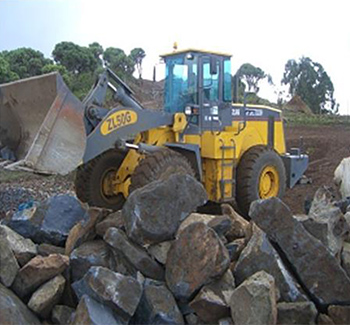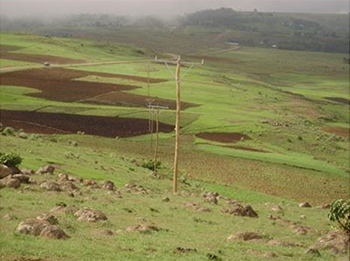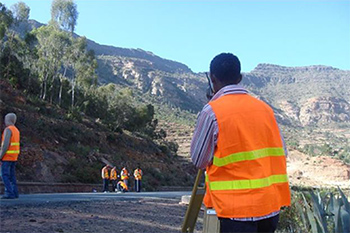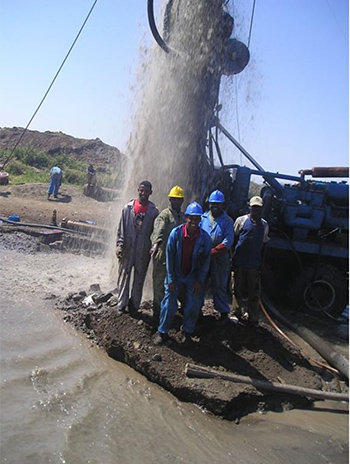SABA Engineering: A leading consulting and contracting company in Ethiopia
Eng. Samson Bekure Tefera, Managing Director of SABA Engineering
Established in 1992, SABA Engineering is a consulting, contracting and manufacturing company involved in different engineering disciplines, including topography, design and testing. SABA Engineering has taken part in many projects throughout Ethiopia; in road design, road construction supervision, projects related to the Millennium Development Goals and others, thus substiantially contributing to the development of Ethiopia.
Interview with Eng. Samson Bekure Tefera, Managing Director of SABA Engineering

What is your overview of the economy in Ethiopia and what are your expectations for 2014 and beyond?
The economy of the country is growing quickly. I think for more than the last couple of years it was growing by double digits. Ethiopia is one of the countries with no oil resources and the economic growth is really incredible. Of course, we will see much better growth to come. That is my expectation.
Can you give us a brief history of SABA Engineering and some of the things that you have accomplished since inception?
SABA Engineering was established in 1992, shortly after the fall of the dictatorship regime. After having the opportunity to establish a private company, the company was established in 1992 as a small consulting firm. As time has gone on, the company has diversified into a multi-disciplinary engineering firm. We now have 21 years of experience. SABA Engineering is not just a consulting firm but is a consulting, contracting and manufacturing company involved in different engineering disciplines.  Also we are providing services in hydrogeological investigation and water well drilling, geotechnical investigation by way of core drilling and other means for foundations, material testing, design and construction supervision. In terms of manufacturing, we are involved in the manufacturing of construction materials such as building materials like concrete blocks and concrete poles for use with distribution lines for electricity and for telecommunication lines.
Also we are providing services in hydrogeological investigation and water well drilling, geotechnical investigation by way of core drilling and other means for foundations, material testing, design and construction supervision. In terms of manufacturing, we are involved in the manufacturing of construction materials such as building materials like concrete blocks and concrete poles for use with distribution lines for electricity and for telecommunication lines.
Having said that this is our core business, SABA has really contributed a lot in terms of country development in the past 21 years. We have been involved in many projects in road design, road construction supervision, the Millennium Development Goals achievements for which we have done a lot of water projects, water drilling for the water supply, and so on. I would say that SABA Engineering has contributed a lot during the course of the development of the country.
Your construction department consists of civil work, construction and an electromechanical division. Does that department rely heavily on contracts from the government?
Most of the projects are from the government – from both the federal and the regional governments. We also do projects for private developers, international contractors, NGOs and others but the major provider of projects is the government institutions.
Can you tell us about the services you provide in terms of hydropower services?
SABA Engineering is involved in multi-disciplinary engineering services. So whenever you see any big projects in the country, SABA is involved in one way or another because of its involvement in multidisciplinary activities.
As I said earlier, SABA Engineering is involved in multi-disciplinary engineering services. At SABA, we do a lot of engineering activities from topography, testing, design, construction supervision and all these things. So whenever you see any big projects in the country, SABA is involved in one way or another because of its involvement in multidisciplinary activities. In short, we have been involved in many hydroelectric power projects that the country has developed. Not only that, we are also involved in and are doing our share in the Millennium Dam. Our activities are broad and in one way or another, we are always involved in a project of this size and other similars.
You are also big in importing engineering equipment, such as laboratory equipment and spare parts. How is that side of the business improving and what kind of growth are you seeing in that side of your business?
This is specialty equipment and really requires specialized knowledge. We are involved in importing equipment related to our field of activity which has also had an impact on the development. We have a laboratory service so we bring in laboratory equipment. For other groups that want to purchase laboratory equipment we give complete service that includes importation, commissioning and training – a complete solution.  We also supply with our foreign business partners based in Europe laboratory equipment for educational purposes. We are supplying and have supplied quite a lot of equipment for many universities for educational purposes. This is something that requires technical knowledge. There are companies with no technical knowledge that are supplying equipment but we bring value to our clients because we don’t only supply equipment but we are here to support them after we supply the equipment, to give training and to follow up on their activities. We have confined our supply business within our field of activities.
We also supply with our foreign business partners based in Europe laboratory equipment for educational purposes. We are supplying and have supplied quite a lot of equipment for many universities for educational purposes. This is something that requires technical knowledge. There are companies with no technical knowledge that are supplying equipment but we bring value to our clients because we don’t only supply equipment but we are here to support them after we supply the equipment, to give training and to follow up on their activities. We have confined our supply business within our field of activities.
Are there many players in this sector of the market and what type of competition have you faced so far?
There is competition because sometimes equipment is coming from Asia and this equipment is very cheap in price. This is one of the challenges because most of the time the client requires a low price. However, other clients do see both the technical aspects and the financial aspects. Of course there are also clients that only focus on the technical and quality aspects and not the price. Sometimes we have to cut down and balance both the quality and the price. This is the challenge that we have with our competitors but still we are surviving in the market and we are supplying especially laboratories for higher education. These are specialized and sophisticated machines and these always come from Europe. We have the advantage in that area.
Africa is growing generally and there has been a lot of growth around Ethiopia. Are those the markets that you are targeting in your business?
 SABA Engineering operates not only in Ethiopia but also in other neighboring countries. We operate in several countries other than Ethiopia, including South Sudan, Uganda, Rwanda, Malawi, Tanzania, Djibouti, Somalia and so on. In fact we have been expanding recently to the west of Africa. Very soon, we will have completed all the necessary steps and will start in the very near future in Liberia and Guinea. We are doing good business in other countries. For example in South Sudan it is an emerging market and we have also expanded our activities beyond the border.
SABA Engineering operates not only in Ethiopia but also in other neighboring countries. We operate in several countries other than Ethiopia, including South Sudan, Uganda, Rwanda, Malawi, Tanzania, Djibouti, Somalia and so on. In fact we have been expanding recently to the west of Africa. Very soon, we will have completed all the necessary steps and will start in the very near future in Liberia and Guinea. We are doing good business in other countries. For example in South Sudan it is an emerging market and we have also expanded our activities beyond the border.
What are some of the challenges that you are facing in this industry?
As you know, there is no business without facing all sort of challenges. If you are really motivated in business, you always face different challenges. I would say that more or less we are similar and when I say similar, I don’t just mean in Ethiopia but in all other countries where we are operating there are similarities. The biggest challenge we have at the moment is sometimes it is hard to get qualified engineers in the market in the required numbers and with the required qualifications. That is the major setback that restricted us from further expansion into other countries.
There are many opportunities at the moment in Africa. We are almost on a daily basis receiving invitations to participate in tenders but due to our limitation of lack of professional experience, we cannot participate in all of these. That is one of the challenges that we have. I believe this challenge or this shortage of professional experts will be resolved very soon because every year there is improvement.  If you had asked me twenty years ago, I would have said it was very horrible and very difficult. Ten years ago, it was better. Last year, it was getting even better. This is because the Ethiopian government has focused on higher education. When I started, there was only one university. Today there are 43 universities. Because of this expansion of the universities and this focus of the policies of the country, we will see a solution to this problem. Every year, many engineers are graduating from various universities.
If you had asked me twenty years ago, I would have said it was very horrible and very difficult. Ten years ago, it was better. Last year, it was getting even better. This is because the Ethiopian government has focused on higher education. When I started, there was only one university. Today there are 43 universities. Because of this expansion of the universities and this focus of the policies of the country, we will see a solution to this problem. Every year, many engineers are graduating from various universities.
The second challenge we have is working with the public sector. Most of the expert or professionals that you deal with in the development institutions are not capable enough to handle contracts. That is one of the challenges that we have. There is a very big knowledge gap between the private and the public sector. Dealing with these kinds of people is very difficult.
The third challenge we are facing in our sector is the contracts that we are always signing with the government have some drawbacks. I would say most of the contracts that we are signing are fixed type contracts and don’t have provisions for price escalation and such. So once we enter into a contract, until we complete it, if the price goes up, we will be affected. That is one of the challenges that we have. These are the three major challenges but there are many challenges that we face.
You are the sole authorized dealer for Waterex, a source independent water generator that transforms air into useable drinkable water. What are some of the applications for this technology?
This is just for bottled water. Bottled water is purified water. This is a machine that converts humidity into drinking water and we are supplying this machine. In fact, the company is based in Lebanon. This water machine works well and is applicable in areas where the humidity is very high, especially in the lowlands. This is a very good solution so we are representing this company and we are supplying this product. We are also supplying this product to the South Sudan and Djibouti and other lowland areas of Ethiopia. It is used in the highlands but it is not as effective as in the lowlands. This is a very good machine and technology that converts the humidity into bottled water – pure potable drinking water.
What is your vision for SABA and where do you see the company going forward?
The company’s vision is to take an active part and get involved in the development plan of the country and to contribute to that. Of course, we want to expand and as I mentioned, expansion is always dependent on the available resources and things like that. When conditions allow us to expand and cover the African markets, after that may be we will go and start operations in other continents. This is the vision.
The other vision that we have is that we have a charity program in which SABA is supporting disadvantaged students who have no one to support them. We want to expand that charity and in fact we are in the process of establishing a foundation of SABA Engineering to support and expand the support to other areas. This is my vision in particular. Maybe after some years, I will become fully involved only in this charity work.
FAIR USE POLICY
This material (including media content) may not be published, broadcasted, rewritten, or redistributed. However, linking directly to the page (including the source, i.e. Marcopolis.net) is permitted and encouraged.